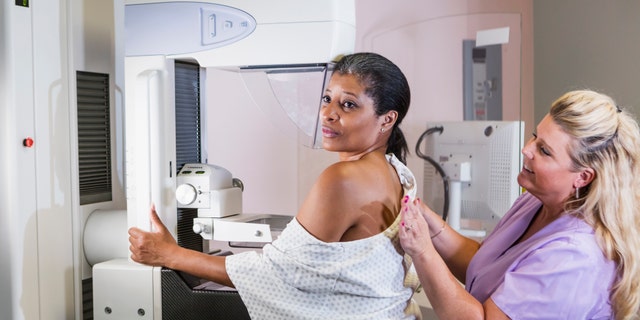
Impact of equity requirements on coronavirus vaccine rollout
‘The Madness of Crowds’ author Douglas Murray argues red states are more successful in rolling out the coronavirus vaccine than blue states.
Women who recently received the COVID-19 vaccine may need to postpone their annual mammogram if they are due for one soon, say doctors in Utah.
Some women who receive the coronavirus vaccine may experience axillary adenopathy, also known as swollen lymph nodes, following vaccination. A doctor in Ohio recently warned that this reaction could be confused for a sign of breast cancer, as many patients are finding swollen lymph nodes under the same arm that they received the jab.

Some women who receive the coronavirus vaccine may experience axillary adenopathy, also known as swollen lymph nodes, following vaccination.
(iStock)
“When one receives a vaccination there is an inflammatory response in the arm,” said Dr. Brett Parkinson, medical director of Intermountain Healthcare’s Breast Care Center in Murray, Utah, told local news station Fox 13. He noted that he and other physicians have seen swollen lymph nodes on numerous screening mammograms of women who have recently received the shot.
This response has been reported in women who have received either the Moderna or Pfizer-BioNTech jab, with Parkinson noting that, in his experience over the past several weeks, the instances of swollen lymph nodes occurring in his patients following vaccination appear to be comparable between the two shots.
CASES OF ‘COVID ARM’ FOLLOWING VACCINATION BEING DOCUMENTED BY DERMATOLOGISTS
Some trial participants for the Pfizer-BioNTech coronavirus vaccine, for instance, reported side effects including swollen lymph nodes, as well as fever, chills, muscle pain and joint pain, according to the study results, which noted that these side effects were more commonly experienced in those between the ages of 18 and 55.
In an effort to avoid causing alarm among patients, Parkinson and other physicians at Intermountain Healthcare have encouraged women who recently received the jab to delay their annual mammogram for at least four weeks following their second dose. Or, he said, patients should come in before receiving the first dose.
CLICK HERE FOR COMPLETE CORONAVIRUS COVERAGE
He told Fox 13 that the guidance was in accordance with the Society of Breast Imaging.
“We don’t want these patients to get a false positive to have this sort of alarm,” Parkinson said.
Source: Read Full Article
